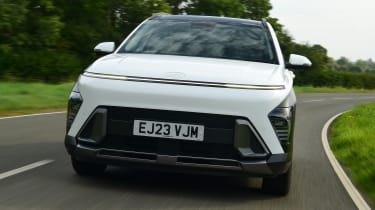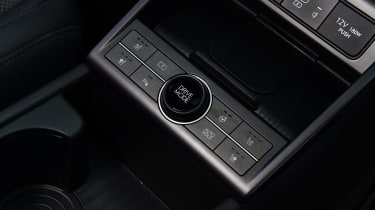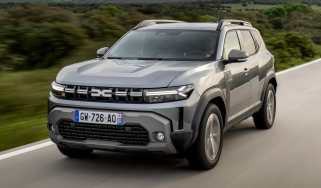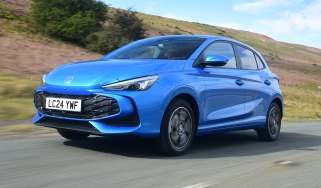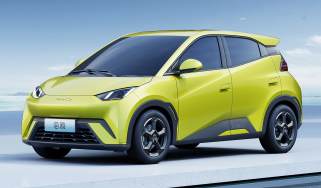Hyundai Kona - MPG, CO2 and running costs
The Hyundai Kona is offered with a choice of efficient powertrains, while the EV boasts over 300 miles of range
Like the original, the Mk2 Hyundai Kona is available with a choice of pure-petrol, full-hybrid or all-electric power. The 1.0-litre petrol Kona will return up to 48.7mpg and 131g/km on average if you stick with the standard six-speed manual gearbox, while automatic models returns less at 47.1mpg and 136g/km. Meanwhile, 1.6-litre petrol Konas can average up to 43.5mpg and 147g/km when equipped with the manual, or 44.1mpg and 145g/km with the auto ‘box.
The Kona Hybrid pairs a 1.6-litre four-cylinder petrol engine and six-speed automatic transmission with an electric motor and pretty tiny 1.32kWh battery. Because this is a full-hybrid, not a plug-in hybrid (PHEV), you don’t charge the Kona Hybrid yourself; instead, the car recuperates energy when you slow down.
Hyundai says the Kona Hybrid will average 60.1mpg and 106g/km, which is higher than the hybrid Renault Captur, but a little below the 64.2mpg figure of the Toyota Yaris Cross. In our experience, if you’re just driving around town where the electric motor does a lot of the legwork, it’s possible to see more than 70mpg with very little effort. Cruising on the motorway at 70mph, we’ve seen the fuel economy figure drops to just over 50mpg.
Finally, there’s the Kona Electric. Standard-range models are powered by a 48.4kWh battery that’s good for a range of up to 234 miles, while long-range versions use a larger 65.4 kWh battery that boosts the compact electric SUV’s range to 319 miles – provided the car has 17-inch wheels. If you don’t pick the smaller 17in wheel option pack on the top-of-the-range Ultimate trim level, its standard 19-inch wheel reduce the range down to 282 miles. Every Kona Electric also comes with a heat pump, which means warming the cabin in the colder months shouldn’t eat up the range, as it does in EVs without one.
More reviews
Car group tests
- Honda e:Ny1 vs Hyundai Kona Electric 2024 twin test: an electric SUV duel
- Hyundai Kona vs Honda HR-V: hybrid SUVs battle for supremacy
- Old car vs new car: Rover 200 vs Hyundai Kona
In-depth reviews
Long-term tests
Road tests
It’ll take just over six hours to fully recharge the standard-range Kona Electric’s battery using a typical 7.4kW home wallbox, or nearly nine hours for the long-range version with its bigger battery. But because long-range models also get a faster maximum charging speed (101kW vs 74kW for the standard-range car), it only takes 41 minutes to charge both from 10 to 80 per cent (going from roughly 30 miles of remaining range up to just over 255 miles of range) from a DC rapid charger.
Given that the Kona Electric produces no tailpipe emissions, it’s the cheapest to run as a company car, currently sitting in the two per cent Benefit-in-Kind (BiK) band until 2025. Meanwhile the petrol and hybrid versions attract 31 and 25 per cent BiK rates, respectively.
Insurance groups
The petrol-powered Kona starts out in insurance group 16 (out of 50), climbing to group 18 for 1.0-litre models with the automatic, and up again to groups 25-28 for 1.6-litre models. The Kona Hybrid on the other hand sits in group 16 if you get the base Advance-spec model, or group 18 in any other trim. Finally, the 48kWh Kona Electric sits in insurance group 25, while the 65kWh Kona Electric lands itself in either group 31 or 33, depending on the trim level.
If you need a small SUV with lower insurance costs, consider either the SEAT Arona, which in entry-level 1.0 TSI SE form is in group nine, or if you’re after a hybrid, the Toyota Yaris Cross in 1.5 Icon trim is in group 11.
You can get personalised car insurance quotes fast with our comparison tool powered by Quotezone...
Depreciation
Our latest expert data suggests that the new petrol Kona and Kona Hybrid will retain between 55 and 58 per cent of their original value after three years and 36,000 miles of motoring, which is about the same as the Ford Puma is projected to hold onto. If you want a small SUV that retains its value even better, take a look at the Volkswagen T-Roc. In 1.0 110 Life trim, it’ll retain around 60 per cent of its value over the same period.
The Kona Electric isn’t expected to fare as well on the second-hand market, retaining 51 per cent of its value at best.
To get an accurate valuation on a specific model check out our valuation tool…
